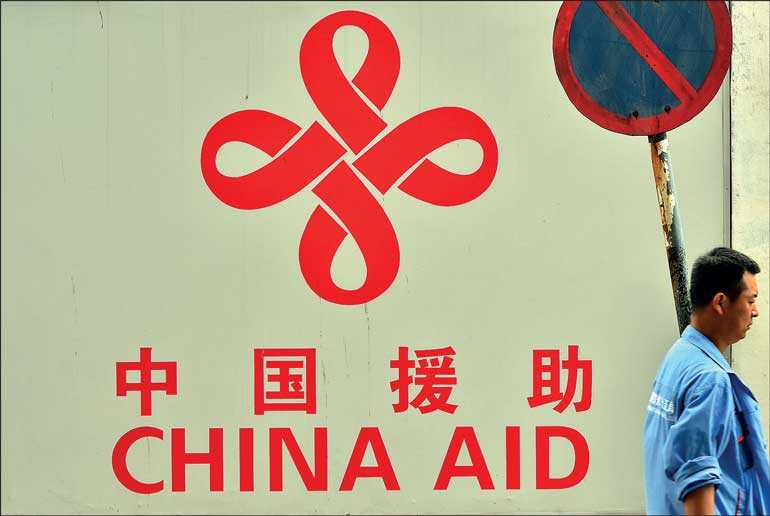Monday Feb 16, 2026
Monday Feb 16, 2026
Friday, 11 January 2019 00:00 - - {{hitsCtrl.values.hits}}

Are so-called sovereign nations free from international influence? What is the role of external forces in their socio-economic development and public policy outcomes?
Some writers claim that the recent political struggle in Sri Lanka reflects the geopolitical rivalry between China and India in South Asia. There has been a shift in foreign policy under both Sirisena and Wickremesinghe, whereby inclination towards India and the US has been greater than toward China when comparison is made with the Rajapaksa era. 
A considerable amount of debate and discussion exists on the role of powers such as India and China on one hand and the West on the other influencing Sri Lankan policy and polity. Scientific research on this topic is somewhat limited.
Historically, external organisations such as the United Nations, European Union, World Bank, IMF, SAARC, Colombo Plan and many other international organisations have had a role in the development of Sri Lanka. Pro-Western Sri Lankan governments have periodically shown willingness to adopt Western policies and doctrine, often in exchange for foreign investment and aid.
While the ‘West’ has instigated national action within Sri Lanka to respond to the internationalised norms and principles of governance, more recently, China has offered a template for creating wealth and stability with little political liberalisation or strings attached in countries beyond its own border. In this context, what is the role of external actors when framing and defining national issues? What sort of values and beliefs do they hold, and how have external influences affected national policy outcomes?
Powerful external influence cannot be considered in isolation or detached from the national context. Ideology, public opinion, national political actors’ interests and their power relations are also important factors that explains internal policy outcomes. The provision of some simplified insights is offered to explain how external influence on nation states can shape an internal progression towards policy transfer.
Policy transfer theory seeks to explain the adoption of a policy which has been used in one area, or country, to address a similar previously existing problem elsewhere. This theory is used in the fields of political science, international relations, sociology, public policy and other related fields and has gained momentum to inform policy change in various fields and across countries as societies become more alike due to influences of industrialisation, modernity and harmonisation. The role of international knowledge experts is discussed, why and how they have become involved in defining national problems and setting the agenda for policy transfer.
This article continues the research from my doctoral thesis, in which some international relations theories were utilised to explore the relationship between socio-economic development and public policy-making in Sri Lanka. No partisan view is held, but hopes to enable the reader to understand why and how some international policies are transferred and under what conditions.
The historical context of policy transfer
Sri Lanka has been subject to voluntary, negotiated or coerced forms of policy transfer applied by the colonial administrations from Portugal, the Netherlands and Great Britain respectively. More recently, policy transfer has taken place in the context of affluent donor countries, global financial institutions, transnational and international organisations, and other influential institutions which introduce and sometimes coerce policy change in order for the Sri Lankan government to secure loans, grants or other forms of aid or investment.
After independence, the aid which was provided to the Sri Lankan Government in the 1950s from the Colombo Plan was directed towards the renowned Gal Oya project to expand agriculture, river valley development, supply of electricity and livelihoods for the residents in the Gal Oya and adjacent areas. A total investment of $ 67.2 million was collaboratively allocated between the US and the Colombo Plan for this project. By the mid-1960s, Canada, as part of infrastructure development, had donated diesel-electric locomotives and provided financial assistance via the Colombo Plan to expand the main airport in Katunayake.
The Colombo Plan further granted £113 million originating from the UK to build the double curvature arch Victoria Dam. These development projects have been significant and have undoubtedly improved the lives of many people. However, what do we know about the principle beliefs of international organisations who provide aid and investment to Low and Middle Income Countries (LMICs)?
For example, some academics argue that the Colombo Plan was not merely an aid program. The program was linked to the strategic interests and beliefs held by the funding countries, especially within the context of promoting social and economic stability in the newly independent Commonwealth countries, so as to make them less likely to embrace communism.
Another common criticism of the Colombo Plan is that it became an extended arm of British imperialism as it offered economic solutions almost exclusively for problems which were political and social. It is no secret that the World Bank and IMF share a principle belief in the promotion of neo-liberal market policies, which are often a condition of aid and investment granted to LMICs.
A research report looked at development finance provided to 20 developing countries and concluded 18 out of the 20 countries had privatisation related conditions attached in order to obtain loans from the World Bank and IMF. Sri Lanka is no exception. The underpinning ideology of these international organisations is that state-owned enterprises are underperforming, inefficient or poorly managed and are not sustainable in the longer term. More recently, there has been a notable shift in this ideology and some international organisations such as the World Bank are moving away from promoting extreme neo-liberal policies in LMIC.
Mechanisms of policy transfer
The agents involved in policy transfer require some discussion. While many agents can be identified in the area of policy transfer, the article will focus on international knowledge experts as they have had a crucial role in defining national problems, the diffusion of ideas and solutions to address a multitude of problems.
From time to time, Sri Lanka has sought advice and support from international experts in areas such as: poverty alleviation, education, health, climate change, debt and corporate finance, national and regional security and international trade. While some of these experts directly represented organisations such as the World Bank, IMF, United Nations, Colombo Plan, SAARC others had significant links with these international organisations.
In general, knowledge experts represent the principal and causal beliefs, and consensual knowledge of the international organisations they represent. For example, knowledge experts who represented SAARC and Colombo Plan had a causal belief that terrorism and drug trafficking were a direct threat to socio-economic development in member states. Uncertainty on how to respond internally to these problems at the time gave rise to a stronger role for agents and knowledge experts originating from outside Sri Lanka.
Stringent law enforcement and regional cooperation as a common policy response was believed as the solution to address the problems of terrorism, money laundering and drug trafficking. International knowledge experts through their various scientific and technical committees have often managed to frame these issues as being subjects of national interest, requiring action by elite decision-makers. So, how do national actors or agents come into contact with international knowledge experts?
One method is that politicians, civil servants, heads of institutions and policy makers become part of an international knowledge transfer undertaking as a result of attendance at, or membership of, the various national and international committees, conferences, workshops, seminars and international study tours. Ideas, beliefs and policies are often diffused at these forums where participants can be socialised into their internationalised norms and principles of certain practices and governance.
It is well-known that some members of municipal and provincial councils, representatives from State-owned enterprises, civil servants, members of Parliament and advisors to the Sri Lankan President have attended various international events from time to time. Sri Lankans often received scholarships or their tour was funded by international organisations. Accordingly, organisations such as the United Nations, World Bank, IMF and SAARC, through their coordinated efforts, have increased opportunity structures for our national actors to engage and facilitate policy transfer.
Institutionalising international norms and practices
Do principles, norms and international policies always get transferred and translated into national policy and practice? It is a complex area.
There are a number of international conventions or treaties that Sri Lanka is party to. For example, the country has become a signatory to the many UN conventions which include: against corruption, international covenant on civil and political rights, convention on the rights of a child, framework convention on climate change, convention against illicit traffic in narcotic drugs, chemical weapons convention, convention on elimination of discrimination against women, WHO framework convention on tobacco control.
National intervention is required to ensure that internationalised principles and norms are translated into routine practice within Sri Lanka. Amending existing legislation, introducing new legislation, establishing particular committees/boards or institutions can be recognised as mechanisms that may institutionalise and give effect to international conventions.
The UN provided financial aid and technical support, particularly in the 1980s and ’90s, for Sri Lanka to come into line with a number of international conventions. Funding often focused on the setting-up of systems, institutions and technical support to amend existing legislation. Once legislation and institutions are in place, ideas are likely to prevail as governments and their key actors become socialised to institutionalised regimes and practices. It also becomes politically costly to reverse such practices as new interest groups mobilise around them after recognising that material gains are possible from the application of new ideas.
Although Sri Lanka has been a signatory to many UN conventions, domestic legislation, systems or institutions were not often in place to give effect to some of them. In certain instances, it has taken more than a decade to amend or introduce new legislation. After the end of the civil war Sri Lanka experienced significant pressure from the UN to give effect to a number of its conventions and this occurred against the backdrop of human rights allegations being levelled against the Sri Lankan Government by the UN.
Drafting new and amending existing legislation to promote human rights and good governance became a top priority for the Sri Lankan Government in order to satisfy international scrutiny to ensure that it could continue to benefit from trade concessions awarded through the GSP scheme. Recently, the implementation of human rights conventions and the establishment of good governance frameworks have become additional pre-conditions for international grant aid provided by the West.
Future directions
We have acquired sufficient knowledge about the norms and principles promoted by Western international organisations and associated policy transfer. However, there is no research on Chinese influence on Sri Lankan policies.
The China Development Bank and the Export-Import Bank of China both provide similar amounts of finance to developing countries when compared to the World Bank. Within this context, China has actively promoted reforms in the IMF, World Bank, and the UN. However, there is little scientific evidence on the normative and principle beliefs of major Chinese corporations and banks when it comes to socio-economic development in LMICs.
Sri Lanka could turn to China in the foreseeable future if there is a shortfall in economic assistance provided by the West. In this context, there is a need to understand the values and beliefs of powerful actors within China, the nature of their relationships with Sri Lankan political actors, and to identify any tensions, contradictions and coalitions in the relationship framework of socio-economic development.
Research should additionally examine the division between China and the West so as to explain any continuity and shift in policies and policy transfer from both of them.